With a long campaign and legal battle environmentalists, government, and local communities were able to bring the oil palm plantation holder PT. Kalista Alam to court and have it convicted for the use of fire in the Tripa peat swamp forest, Aceh, Indonesia. This unique case calls for the question ‘Can campaigns save forests?’ In this article we describe the process that led to the court case and the final conviction, showing also that with the conviction the campaign has not ended. We use the Advocacy Framework to look at this campaign presenting it in an historical line and looking at the several local actors, political change at national and local level that together have brought this outcome. We conclude that what is seen as a big success at the moment the court's verdicts came, might only be an intermediate victory. © 2019 Elsevier B.V.
View source

